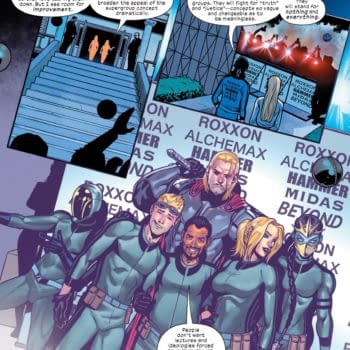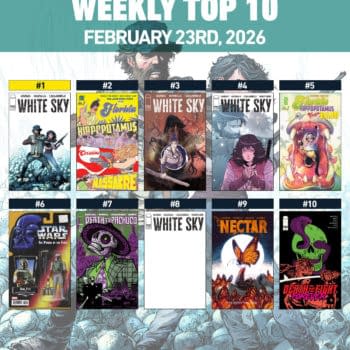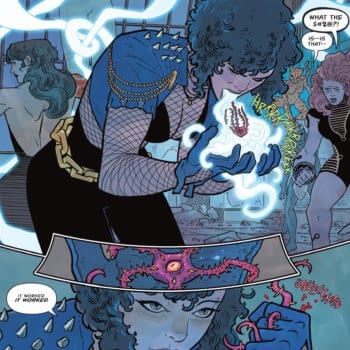Posted in: Comics | Tagged: black jack ketchum, Brian Schirmer, Comics, image comics
Talking With Brian Schirmer On Black Jack Ketchum And What's Next
By Octavio Karbank
There are many writers in the world, but talking to someone relatively new to a particular industry, in this case comic books, tends to be a different experience from interviewing a veteran of the art. Here we have Mr. Brian Schirmer, and while you might not have heard of him yet, odds are that'll change in the coming months. Writer of Ultraslvania and the upcoming Black Jack Ketchum for Image Comics, be on the lookout for this man and his work!
Octavio Karbank: When it comes to comics, you might not be the most well-known writer, so let's talk about your work leading up to Black Jack Ketchum and what you're about.
Brian Schirmer: Sure! My first actual, published, thing was a series called Ultrasylvania, which was produced in conjunction with the Academy of Art University San Francisco. As a result of that we ran three successful kickstarters over the course of eighteen months and put out three trade paperbacks, totaling somewhere around 250 pages of comics. It was basically the story of Frankenstein's monster and Dracula as if they had been world leader s in the nineteenth century, and tracking their history from the end of the eighteenth century and we go all the way up until the 21st century. Their world at that point is very different from our world today.
OK: How did you think that up?
BS: I was travelling in Europe in 2011 and as any good writer, I had a little notebook with me and I scribbled down a variety of ideas on that trip and that was just one of them that stuck with me. I think the basic premise started with Dracula. What if Dracula had been a world leader instead of a self-proclaimed creature who was basically hiding in his castle for decades, or centuries. It stuck and reverberated, and eventually took root, and found life, which is great.
Basically, from there, I took it on the road, started doing conventions at the end of 2012. Actually it was New York Comic Con 2012 where we debuted our first trade and now here we are, literally three years later. That series has been done now for a year and a half and in the time in between it took me to shows all over the country and I met a lot of great people and it opened a lot of doors.
OK: And how's the general reception been for Ultrasylvania?
BS: Great! It's been fantastic! We do very well at every show. For some reason, and I'm not questioning it, we do best at Rose City Comic Con in Portland. There is a ravenous audience for that series in Portland, and I don't know why, and I don't question it. They're great people!
OK: There isn't a lot of information about your upcoming series. Can we talk about it?
BS: Yeah, absolutely! It's called Black Jack Ketchum. It is a surreal Western focusing on a guy who is probably, by his own definition, a C-grade outlaw, who gets mistaken for an A-grade outlaw. He winds up pursued by forces both normal and otherwise. Anything from ill-educated bounty hunters, to guys we call the Dusters, who are basically the Wild West equivalent of the Nazgul. It starts there and just gets weirder and weirder from there on.
OK: There's a ton of reading material out there. That said, how do you think Black Jack Ketchum stands apart from all of it?
BS: If you want something that's weird, we've got that. It's also something that I'm seeding a lot of…not control, but I am giving my readers the benefit of the doubt. I'm not going in there handholding. You're given the requisite information that you need in the first issue and I'm trusting that the reader is going to be able to suss out story and bits out of ambiguity. So if you like ambiguity, if you like dream-like settings and characters and situations, and tweaking of genre, we got all that.
OK: By your description, Black Jack Ketchum almost sounds comedic in tone. Is that a fair assessment?
BS: There's definitely humor in it. I didn't want it to be overly dark and gritty. My favorite comparison that anyone has given me thus far is what a Western comic would be if David Lynch made a Western comic. I'm a huge Lynch fan, so I take that as a tremendous compliment. If you like that kind of tone and you want to read that in a Western, then I guess we deliver.
OK: How long will Black Jack Ketchum be?
BS: It's a mini-series, that's short a sweet. It's a four-issue mini. The first issue comes out December 2nd. Everything is complete, meaning that all the art is done and turned in, so we're not going to miss a ship date. I have people asking me if it's really popular, can it go on. Let's put it this way, it's four issues and done. If we get insane numbers and fantastic reviews, we'll find a way, I guess, to make a sequel, but it's pretty much a complete idea.
OK: How did you pitch the idea?
BS: I met Eric Stephenson at San Diego Comic Con 2014, and we chatted briefly. He took my card and said that he'd drop me a line a few days after the show. True to his word, he did. We traded a couple emails, I pitched him a couple different ideas, and I'd say about six weeks, maybe eight weeks, later, he gave us the thumbs up. It happened so smoothly and relatively quick, compared to things I've worked on with other people, that I had to query a couple of friends who were also writers and ask, "Does this mean what I think it means?" and they said, "Yeah, you're good."
OK: Are you happy with the finished product?
BS: Oh hell, yes! When I'm lucky, and I have been lucky quite frequently since I've started doing comics, I find myself paired with an artist that will deliver work that honestly transcends what I had envisioned in my head and what I had in the script. That's what I got with Claudia Balboni. She is our artist and I know everybody says their artist is the next big thing and I honestly think that's true in this case, because Claudia has worked in the U.S. before, she's based in Rome; she's worked for IDW, but everything she's done for them has been licensed. She did work on Star Trek, she did work on True Blood, but characters have to be drawn to model and so on and so forth. Whereas this we were creating from scratch, so she had a very influence on the look of the book, on the design of the characters, and as the pages came in I would just feel like she's in the middle of the longest guitar solo imaginable, and it's great!
OK: What would you like your audience to take away from your work?
BS: Without sounding horribly pretentious, I would hope they would be, at the very least, entertained. If it gives them something to think about, even on a subconscious level; with a book that's dealing with, in part, the wrong man being accused of something he didn't commit. It starts to deal with themes of identity. Are we who we are, or are we who others see us as?
OK: Is the theme of identity then personal to you?
BS: Yeah, I think so. I think it's a common theme that a lot of people don't think about necessarily in those terms. I think most people, whether they want to admit it or not, are concerned with how they're perceived by others. This story really takes that and runs with it.
OK: Did you always want to write comics?
BS: Short answer, no. Longer answer, I spent probably the better part of a decade writing spec scripts for films that pretty much never came to anything. I was not planning on giving it up, and I guess I haven't really, but a few years ago I had a chance meeting with a couple of folks. One was Kelly Sue DeConnick, who at the time was a friend of a friend, and now I count her as a friend too, and a guy named Daniel Cooney, who is also a comic creator and teaches at the Academy of Art in San Francisco. I met them both at around the same time and saw that they were both experiencing a level of success as comic book writers; that was something that'd never crossed my mind as a possibility. Yet I'd always been very focused on myself, not limiting myself, like if I was going to be a screenwriter I didn't want to say that I was only a screenwriter. I was just going to write, and if it was film, great, if it was novels, great, but comics never crossed my mind, so I thought I'd give that a shot.
Within six months I had managed to pitch to a tiny publisher up in the Pacific Northwest, and basically received a contract to write an original graphic novel. I did that, it never got produced, but it was enough to get my juices flowing. I then did a self-published anthology with some friends and we sold that at WonderCon when that was still in San Francisco, Eventually, I was in Europe, I came to the idea that ultimately became Ultrasylvania and that came about, and this is the real answer to your question, I had a former student from the Academy come to me and say, "Hey, they should teach a class where the students get together and illustrate something you've written." I laughed at him; I thought it was a silly idea. I realized two or three days later that I was still thinking about it and I wound up going and talking to the director of the illustration department and pitched him the idea, asking what he thought about it. He thought it was a great idea and suddenly we were up and running and it became a class. We basically had our own studio at the school where the students would work, and parsed out different sections of each volume to different students so that they would get the experience of working in a studio setting and getting feedback from the instructor who was also the editor. A guy named Jeremy Saliba, who is my very good friend and my editor on Black Jack Ketchum. They also got to experience it initially becoming a web comics, and then the kickstarter and then ultimately being published and having it out on Amazon and various comic stores. Again, taking that on the road and going to conventions and meeting people opened a lot of doors, and that door was Image.
OK: What's next for you?
BS: I am working with two artists right now; one has not done anything noteworthy, yet. He is about to do something huge next year that we are working on, that involves spies; I will say that. I'm working with another guy who is rather well established and we're in the early stages of doing a fantasy-detective story. I've got other things, but it's way too early to discuss them.
OK: What does the art/craft of storytelling mean to you?
BS: For me, it is something I can't escape. One of my earliest memories, I was probably five or six, I remember drawing comic strips. I'm forty-five right now and at the time, Charlie's Angles was on, the original series. I never watched it, since I was five or six, but I was aware of it, and I remember drawing comic strips that had stick-figure women of Charlie's Angles fighting basically prune faced, stick-figure undersea guys from Atlantis. From there, I never stopped telling stories. I tried; honestly, about ten years ago after my father passed away, I was having a midlife crisis. I moved away from where I lived, quit my job, went to live in a whole other city on the other side of the country. I went to apply for "regular" jobs, and did very well, with a mindset of I'm going to be an ordinary member of society. I got offered a couple of jobs, but I never accepted them, because by the time the offer came in, it wasn't for me. I needed to go to this city and have this experience so that I could know that what I was doing was right. Whether anyone pays me for it, or whether anyone reads anything I do, I will be writing until I kick. It is as natural for me as breathing.
Octavio Karbank is a writer and bona fide Whovian. Living in Massachusetts, you can find him on Twitter @TymeHunter and his blog www.cozmicventures.com





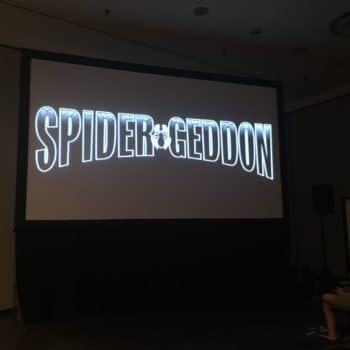
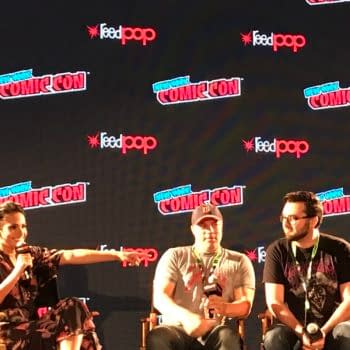




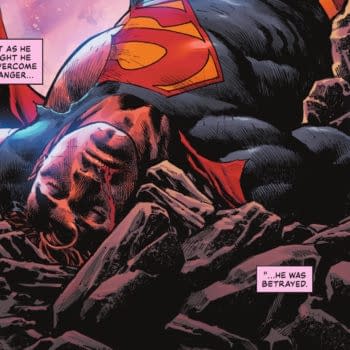
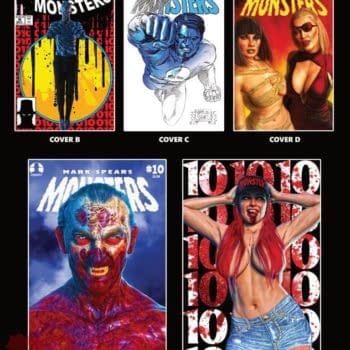
![White Sky #]1 second printing](https://mlpnk72yciwc.i.optimole.com/cqhiHLc.IIZS~2ef73/w:350/h:350/q:75/rt:fill/g:ce/https://bleedingcool.com/wp-content/uploads/2026/02/unnamed-2026-02-18T203050.994-350x350.jpg)
